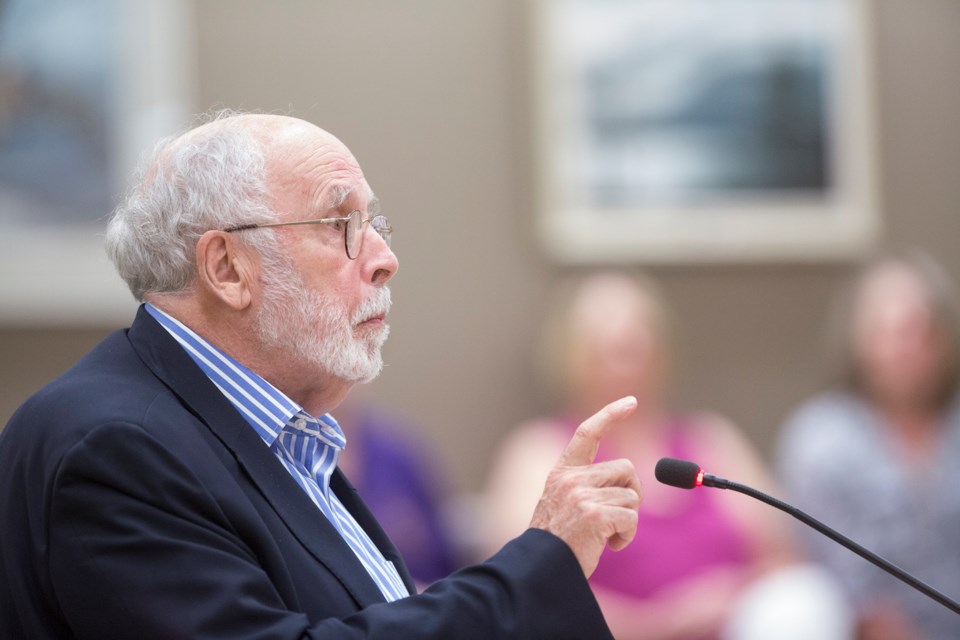Technically speaking, Essar Steel Algoma is a good, solid steel mill.
From a business standpoint, however, the Sault steelmaker has some fiscal and competitiveness issues to work out.
That was the message that Dr. Peter Warrian from Toronto's Munk School of Global Affairs had Monday night for Sault Ste. Marie city council.
"I think they're getting there. It's going to take a little while longer," said Warrian, former research director for the United Steelworkers of America and former chief economist for the Province of Ontario.
"At a recent university event, I was introduced as being Canada's leading academic steel expert," Warrian chuckled. "And then the guy says all the others are dead."
Essar Algoma needs to push the product development side of its business, Warrian said. "On the technical side, it's a good mill. They need to straighten out the financial side."
Things are going well right now at Essar Algoma but the seas will soon get a bit stormier, Warren predicted.
"Steel prices will drop, maybe a hundred dollars a ton."
"I'm not trying to scare people, but you've got slow growth in the economy."
"It will go down. But I'm not saying disastrous down."
"Unless someone has repealed the laws of economics, somewhere around 24 to 36 months out there, there's going to be a recession some time."
"If we have highly leveraged companies, even if the restructuring works at Stelco, works at Algoma, there's going to be a vulnerability out there. So the question is how much new initiative and innovation to put into the system, between that 24 and 36 months?"
"If you had gone around this mill seven years ago and come back again, you'd be amazed at how good a job they've done. Introducing new technology. Aligning things. It's a good asset."
Warrian talked about Essar Algoma's iron ore supply contracts.
"The contracts where they had to overpay — and Cliffs insisted they overpay — it drained all the working capital out of the company."
"Business is cyclical but working capital helps you go through those things. If you drain all the working capital out of it, you're in terrible shape. You're just vulnerable."
Queen's Park and Ottawa are currently reluctant to move on pensions and other regulatory issues faced by Algoma because steel prices are up.
"It takes the heat off. I think we're going to get some more pressure — not disastrous pressure — that will bring these things to a conclusion in the next few months."
The current atmosphere of fundamental insecurity brought on by the Trump administration is creating problems for everyone, Warrian said.
The 2007 purchase of Stelco by U.S. Steel set the Canadian industry back a decade, he said.
"U.S. Steel bought and operated Stelco like a classic Canadian-U.S. branch plant."
"Basically, U.S. Steel stripped out all the product development and marketing stuff and they stripped out all the engineers. Now, they have to rebuild it."
"We all thought Stelco was the big cheese in the shop. In North American terms, Stelco became a Tier 2 asset."
"Looking back, we're the problem. If we knew that was going to happen, Canadians shouldn't have let a prime industry like that to be taken over by foreigners without a peep."
In terms of direct-cost competitiveness, Essar Algoma's DSPC (direct strip production complex) is probably the lowest-cost steel producer in North America, but the company needs to look to new product lines, Warrian said.
"You can be the lowest-cost producer, but you're stuck in the commodity end of the market. There's things you can do... to go up the value scale to the higher-grade steel."
Geographically speaking, Essar Algoma has easy access to North America's auto-manufacturing corridor, but it still has a disadvantage of $15 to $18 a ton in shipping to the nearest auto assembly plants in Oakville, Ont.
"It's not the OEMs (original equipment manufacturers) you want to target on. You target on the supply chain. You start that at Saginaw and you start going south. You've got a clear run down a basically empty interstate."
"Go to where the engineers are, because you need to tap into the development. Don't just count where the assembly plant is."
Warrian talked about the current trend of "lightweighting" in auto manufacturing: using new materials and manufacturing processes to build lighter cars and trucks offering improved fuel efficiency and handling.
"New automotive steels are not the sweet spot of Algoma. They're on the fringes of it," he said.
He also referred to increased residential use of steel.
"Go into a kitchen: you'll see all kinds of steel. Steel appliances, etc."
"Stelco is short on slab. Algoma is surplus slab. Algoma is short on coke. Stelco is surplus on coke. I'm not going to win any Nobel Prize for economics for that one, but there's a trade to be made."
Essar Algoma has been protected from its creditors since November 2015 when it sought insolvency protection under the Companies' Creditors Arrangement Act.
Last week, Bedrock Industries Group LLC obtained court approval for a plan to buy and restructure Stelco, saving 2,200 jobs and protecting retirees by allowing pensions to continue without interruptions or reductions.
Bedrock's arrangement also provides greater certainty that Stelco retirees will receive other post-employment benefits including dental benefits, prescriptions, and life insurance.




